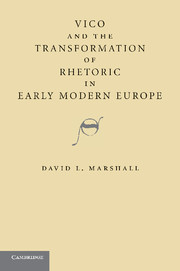2 - At the Limits of Classical Rhetoric
Published online by Cambridge University Press: 06 July 2010
Summary
Two years after Vico was appointed professor of rhetoric at the University of Naples in 1699, the city was rocked by the Conspiracy of Macchia. A group of Neapolitan nobles—led by Gaetano Gambacorta, the Prince of Macchia—attempted to overthrow the Spanish administration. The objective was not Neapolitan independence. Instead, the nobles were satisfying personal ambitions, hoping for advancement under an Austrian rather than a Spanish viceroyalty. The assassination attempt against the Viceroy was foiled, Austrian reinforcements did not arrive, and when the nobles turned in desperation to the ordinary people of the city for support, no one joined them. The conspiracy failed. In the long history of Neapolitan subjugation to foreign powers, the 1701 attempted coup is little more than a momentary ripple. But the sequence of events is of real interest to the present study because Vico wrote a history of the conspiracy, a history he never published or even publicly acknowledged. The reasons for Vico's silence are uncertain, but the De coniuratione principum neapolitanorum is nevertheless highly revealing of the difficulty he had in applying classical rhetorical forms to the contemporary political realities of his native city. What is most striking about this encounter between rhetoric and Naples is simply the limited utility of rhetorical historiography traditionally conceived. Although Vico never wrote a concerted treatment of the city using the kinds of conceptual tools and habits that he developed in the Scienza nuova, it is possible to extrapolate from that theoretical text to an analysis of Neapolitan cultural and political life that is far superior to that on display in the De coniuratione.
- Type
- Chapter
- Information
- Publisher: Cambridge University PressPrint publication year: 2010



